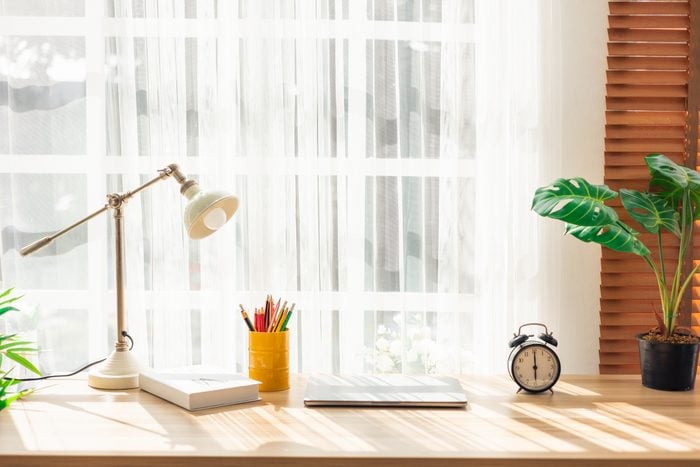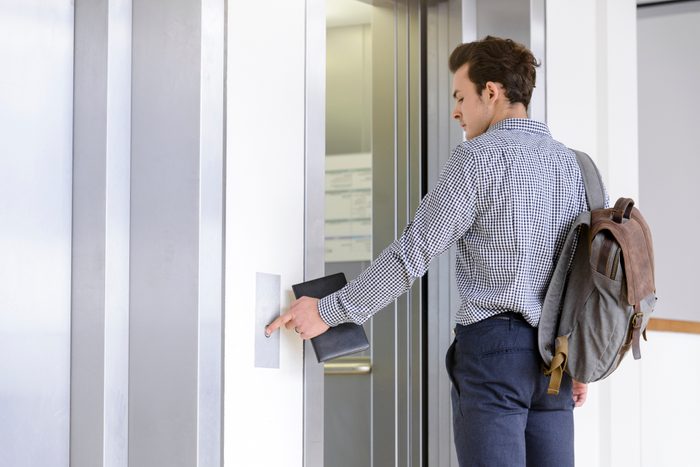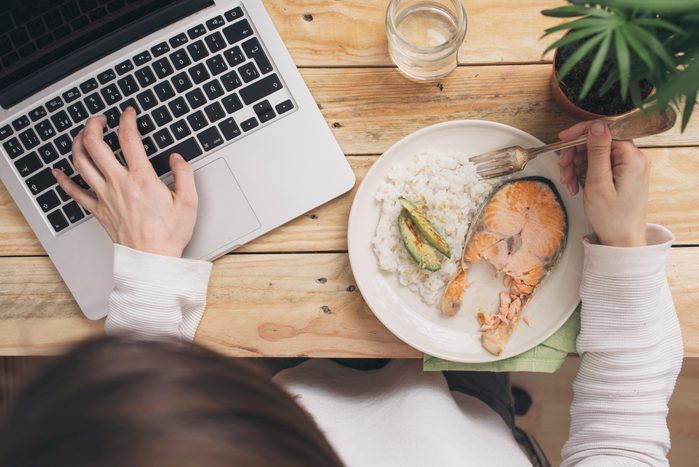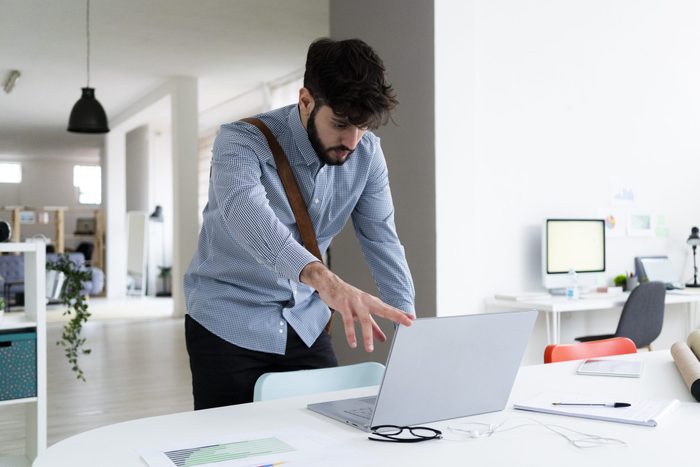
Ditch bad work habits
Using quirky office supplies. Writing in Comic Sans font in work emails. Putting over-the-top holiday decorations on full display on Zoom. These are just a few of the workplace habits that employees wonder about frequently, especially post-pandemic, according to business-management consultant Alison Green. Many of these issues aren’t a big deal (use your Pokémon mouse with pride!), but some bad work habits can definitely make others question your professionalism.
That said, this isn’t just about pleasing your boss or conveying a certain image so no one thinks you’re quiet quitting. Replacing bad work habits with good habits will also help you be a better co-worker, be more productive and help you feel more accomplished, relaxed and fulfilled in your job, Green says. Plus, learning etiquette rules is an important job skill that can help you get that promotion.
So, are you making any employment missteps? Scroll through to find out which habits you may need to tweak—or ditch altogether. Also, learn how long it take to break a habit.

Never taking a sick day
There is a certain type of dysfunctional office culture in which people are made to feel like slackers if they take sick days and there’s heavy pressure to come in regardless of how you’re feeling. But these days, especially post-pandemic, that culture is changing, says Green. Now, coming into the office and “powering through” means you’ll be spreading germs and potentially taking out half the office. Working from home? More bosses are starting to realize that working while sick tends to translate to more errors or less-productive days. It’s professional to stay home and rest when you’re ill. Period.
Pro tip: Don’t feel like you need to “prove” your illness, says Green. It’s fine to say you have a cold or are feeling unwell—skip the gory details about your nasty stomach bug. If you’re currently writing your sick day email, make sure to follow the proper email etiquette.

Texting or messaging about important info
Checking in about a meeting time? Texting is fine. Updating your work status? Slack and Teams are great. But save anything more than basic information for spoken and/or written communication, like email, says Green. It’s easy for communication to get misconstrued via text and chats because you lose facial expressions, tone, context and nuance. It’s also harder to document, and you’ll be prone to miscommunication and mistakes.
Pro tip: If you do find yourself having a more involved conversation via text or chat, send a follow-up email to make sure everything was clearly communicated.

Not setting up a proper work space
You don’t want to decorate your work space like a dorm, but you also don’t want it to be bare, says career coach Penelope Trunk. Instead, find a happy middle ground where you have a neat, organized desk with a few personal touches displayed. It makes you look like a person who has a life but also takes their job seriously. Plus, you probably put in long hours at work, so why not make it a space you enjoy?
Pro tip: Display a picture of something that makes you happy and doubles as a good conversation starter, like a pic of your family, dog or favorite hobby. Plus, while a messy desk might indicate that you’re a genius, keep your office space as orderly as possible—and keep clutter out of sight on video calls when working from home.

Not following the dress code
For many companies, what’s considered “work appropriate” has changed greatly since the pandemic started. For example, nice jeans and more casual tops might be A-OK now, whether you’re working from home or in the office. And, of course, you might be wearing yoga pants or shorts on those Zoom calls, and no one has to know! But if professionalism is your goal, it’s essential to follow the dress code for your individual workplace, whether or not it’s official, says Trunk. Most places today use a “business casual” dress code. Think neat, tidy, clean and put-together, not fashion model.
Pro tip: Not sure what to wear? It’s better to be slightly overdressed than slightly underdressed.

Making excuses
If you can’t do something or make a mistake, just own up to it. Being straightforward and honest is always the best policy, even if it feels more difficult in the moment, says Green. You may think you’re trying to please the other person or avoid negative consequences, but people generally see through excuses. Plus, those excuses have the opposite effect, making you look irresponsible and unprofessional.
Pro tip: No one is perfect, and mistakes are bound to happen, so when you do something wrong, address it and move on. On the other hand, be aware of the things you don’t need to apologize for.

Gossiping
No one likes a gossip—no matter how much they like to hear the gossip—and talking poorly about another person at work makes you look untrustworthy, immature and unprofessional, says Green. Even if you think you’re speaking privately and confidentially, you never know who may be listening in the break room. And even if someone is your work friend, you never know who they’re going to pass on your juicy gossip to. Gossiping via text or chat is extra risky, since all it takes is a screenshot to land you in an embarrassing or even fireable situation.
Pro tip: If you wouldn’t say it to someone’s face, don’t say it—or text or chat it—behind their back. It’s one of the things that will help you build trust with your co-workers too.

Responding slowly to communication
It’s frustrating when you’re constantly checking emails, voicemails or Slack messages, but you should make it a priority to keep an eye on your work communication throughout the day. Taking days to reply or forgetting altogether are some of the most annoying email habits. Quickly responding shows you are dependable and accessible, says Trunk. It will also help you: Cluttered inboxes take a mental toll, and quickly clearing yours will lead to less stress.
Pro tip: Set aside time for uninterrupted work, and respond to emails in chunks once your time is up. You get to focus, your co-workers will know you’re busy, and then you can manage your emails in a timely manner. The key is to schedule your time in the most productive way possible, not haphazardly.

Checking your phone constantly
Looking at your phone every time you get a notification is a sure sign you’re not paying attention to the person in front of you. You may think you can multitask, but splitting your attention isn’t actually productive, and it looks rude and unprofessional to your co-workers, says Trunk. This is true even if you’re doing work-related tasks on your phone, since your co-workers can’t tell whether you’re checking your emails or social media. The bottom line? Refrain from taking personal calls, texting and scrolling through your phone while on the clock.
Pro tip: Step away from the phone. Schedule a few specific times to check your phone, and keep it on silent the rest of the time. Worried about emergencies? Your phone has a setting for breakthrough calls.

Skipping all work happy hours
You don’t need to be best friends with your co-workers, but maintaining positive relationships benefits everyone. Part of building these relationships entails making the effort to attend the occasional happy hour, birthday celebration in the break room, retirement party or family barbecue. You don’t have to be a social butterfly, but you should make eye contact and greet co-workers when passing, as well as learn a few basic details about their lives without being invasive.
Pro tip: If you’re one of the many people who struggle with anxiety in social situations, check out these simple tips to overcome social anxiety.

Running late
From car problems to sick kiddos, there will come a time when you’re late for work. Most people are reasonable and understand these situations, but if it happens all the time, it can reflect poorly on you. Plus, your lateness affects others and their ability to do their jobs, so it’s both unprofessional and disrespectful. “Being chronically late implies that you feel like your time is more valuable than theirs,” says Trunk.
Pro tip: Try these time-management tips that actually work. While you’ll obviously need to build some cushion time into your morning commute, managing other seemingly unrelated aspects of your life can also help you turn things around.

Engaging in gross eating habits
Having poor hygiene or bad manners when eating, bringing in super-stinky food (like heating up fish in the communal microwave), leaving old food in the refrigerator, eating other people’s food, complaining about food—we could go on. A quick scan of Green’s Ask a Manager site shows that there are nearly endless ways to look unprofessional and irritate your co-workers with your food habits. The solution is not about perfect manners; it’s about simply being mindful of others’ needs and sensibilities, she says.
Pro tip: Follow the golden rule: Do unto others as you would have them do unto you. If you really can’t help yourself, go out for lunch and take a much-needed break.

Taking all the credit
It’s rare when one person completes an entire project, so if you had help, be generous with the praise and gratitude for others. It builds goodwill and makes you look like a team player, says Green. Hogging the credit may make others reluctant to work with you or resent you.
Pro tip: It can be as simple as saying “we” instead of “I” when talking about the project. But acknowledging some of the excellent help you’ve gotten along the way, whether in progress emails or call-outs in chats, is even better. After all, teamwork makes the dream work, people.

Leaving work early, often
Leaving work early once in a while isn’t a big deal, but it starts to impact your career negatively and make you look bad when it becomes a habit. And this is true even if you come in earlier than most people or do extra work at home, says Trunk. You may bristle at the idea that it’s all about appearances, but sometimes, that’s a factor, especially when everyone else is working regular hours and may need to get in touch with you. The key is to be considerate so that others don’t have to pick up the slack.
Pro tip: If you know you will need to leave early regularly—maybe every Friday, you have to leave 20 minutes early to pick up your child from day care—discuss this with your superiors. It should be hammered out ahead of time, not sprung on your team or simply not acknowledged. If you’re the one in charge, check out these golden rules for being a great boss.
Additional reporting by Kaitlyn Chamberlin.
Sources:
- Alison Green, business-management consultant and author of Ask a Manager
- Penelope Trunk, career coach
